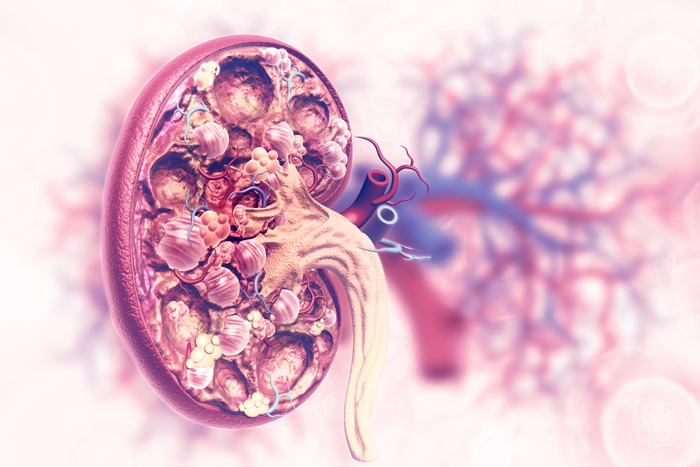Chronic Kidney Disease Treatment & Diagnostics in Karol Bagh, Delhi
Chronic Kidney Disease (CKD)
The gradual decline in renal function is described as chronic kidney disease, sometimes called progressive kidney failure. Your kidneys filter
waste and excess blood fluids that are subsequently excreted in your urine.
When a chronic renal problem worsens, the body may accumulate dangerously large amounts of fluid, electrolytes and waste.Chronic kidney disease may go undetected until kidney function is seriously affected. The treatment of chronic kidney disease focuses on slowing the disease progression, usually by addressing the underlying cause of kidney damage.
Chronic kidney disease can lead to kidney failure, which is deadly and may necessitate artificial filtering or renal transplantation.
If you have this problem and are looking for proper treatment, consult a chronic kidney disease specialist in New Delhi.
A CKD specialist in New Delhi can help you with the tests necessary for determining the health of your kidneys.

What are the symptoms?
- Nausea
- Vomiting
- Appetite loss
- Exhaustion and weakness
- Sleep disturbances
- Changes in the amount of urine
- Feet and ankle swelling
- Severe itching
- Chest discomfort, if fluid collects around the heart's lining
What causes CKD?
- Heart disease
- Diabetes
- You have a family member who suffers from renal disease
- Being above the age of 60
When do you need to see a doctor?
Consult a kidney disease specialist in Karol Bagh if you have any signs or symptoms of renal illness.
When you are at a risk of kidney disease, your doctor may usually examine your blood pressure and renal function.
Request an appointment at Apollo Spectra Hospitals, Karol Bagh, New Delhi.
Call 1860 500 2244 to book an appointment.
What are the risk factors?
- Smoking
- Hypertension
- Diabetes
- Obesity
- History of kidney disease family
- Abnormal structure of the kidney
- Old age
What are the possible complications?
- A rapid rise in your blood potassium levels (hyperkalemia) may damage the functioning of your heart and may be fatal.
- Bone weakness and a greater risk of bone fractures
- Anemia
- Suffering from decreased sexual desire, erectile dysfunction or decreased fertility
- Reduced immune response, increasing vulnerability to infections
- Complications of pregnancy that pose dangers to both mother and developing fetus
How can CKD be prevented?
- Consume a diet low in salt and fat
- Exercise daily for at least 30 minutes
- Consult your doctor regularly
- Avoid tobacco and smoking
- Alcohol use should be minimized
What are the treatment options?
- A doctor may give medicines to help regulate your blood pressure — most often angiotensin-converting enzyme or angiotensin II blocker — and help maintain renal function. Additionally, your physician will recommend a diuretic (water pill) and a low-salt diet.
- Your doctor may prescribe cholesterol-lowering medicines called statins. Chronic renal disease patients frequently have high amounts of bad cholesterol, which increases their risk of developing heart disease.
- In some cases, your doctor may suggest erythropoietin supplements, often combined with iron. Erythropoietin supplements increase red blood cell production, which may alleviate anemia-related fatigue and weakness.
- Chronic renal disease patients may have fluid retention. It can result in leg swelling and hypertension. Diuretics are medications that can help maintain your body's fluid balance.
- Calcium and vitamin D supplements may be prescribed by your doctor to help prevent weak bones and reduce your risk of fracture.
- As your body absorbs protein from meals, it produces waste which must get filtered from your blood by your kidney. Your doctor may suggest that you consume less protein to relieve the stress on your kidneys. Your doctor may also advise you to meet a dietitian who may provide strategies for reducing your intake of protein while eating a balanced diet.
Conclusion
Seek early treatment for CKD and prevent chronic renal failure. Consult the best CKD specialist in New Delhi.
Usually, kidney illnesses cannot be treated. With time, these often get worse. Treatments can help preserve your kidneys and lower your risk.
There is a potential risk of kidney failure. It indicates that your kidneys don't work anymore. It causes your body to build up waste products and fluid. Kidney failure can happen quickly. Life-saving therapies are available. Dialysis performs the job if your kidneys are healthy. It utilizes a blood-filtering machine.
Maintaining your blood sugar and blood pressure in control may help you slow down kidney damage. It can include taking medicines. It is also essential to exercise regularly and keep your weight healthy. Exercise also helps you maintain a constant level of blood sugar. Another approach to alleviating your renal strain is to decrease salt and protein intake.
Treatments
Our Top Specialities
NOTICE BOARD
CONTACT US
CONTACT US
 Book Appointment
Book Appointment


.svg)
.svg)
.svg)
.svg)








